More about the Dominion Voting Systems defamation case against Fox today, Wednesday. I know I’ve been writing about this case a lot, but it’s important. Tonight on his MSNBC show, Lawrence O’Donnell suggested that the evidence being released in the Dominion case is so damaging to Fox and some of its hosts that it’s the reason for the Kevin McCarthy/Tucker Carlson saga, the released January 6 footage, and Carlson’s effort to craft an alternative January 6 narrative. O’Donnell’s theory was that Carlson, who knew the schedule in the Dominion case and when he could expect to see his texts about Trump, including “I hate him passionately,” emerge, lined up the footage as a distraction. That seems like a very probable theory.
Dominion filed its reply brief in support of its motion for summary judgment on Wednesday, asking the court to rule in its favor without the need for a trial because there are no contested factual issues for a jury to determine. It’s worth setting out Dominion’s opening comments to the court—somewhat more informal in tone than typical court filings and, really, slightly snarky—for you to read here. The company can be forgiven for taking a moment, given what it’s been through and what it’s uncovered about Fox News’s internal conduct in the course of the lawsuit. Here’s how it starts out:
“Finally. Fox has conceded what it knew all along. The charges Fox broadcast against Dominion are false. Fox does not spend a word of its brief arguing the truth of any accused statement. Fox has produced no evidence—none, zero—supporting those lies. This concession should come as no surprise. Discovery into Fox has proven that from the top of the organization to the bottom, Fox always knew the absurdity of the Dominion ‘stolen election’ story. Now, having failed to put in any evidence to the contrary (because no such evidence exists), Fox has conceded the falsity of the Dominion allegations it broadcast.
That concession is no small thing. Thirty percent or more of Americans still believe the lie that the 2020 election was stolen. The heart of that lie remains the false conspiracy theory that Fox legitimized and mainstreamed starting on November 8—that Dominion stole the election, using secret algorithms in its software originally designed for a Venezuelan dictator. Because of these lies, Dominion now may be ‘one of the most demonized brands in the United States or the world.’ … Dominion employees still endure threats and harassment. So it matters that Fox in private ridiculed—and never believed—the lie. And it matters that Fox has now in this litigation conceded these allegations were false.”
It’s easy to see how you’d be angry if someone did this to the business that you’d built, and Dominion is right to say that it matters. Of course, in the context of the lawsuit, what matters is the false statements Fox slandered Dominion with. That is what this lawsuit is designed to address. But there is an undeniable larger context: the corruption of the American electorate and the spread of the vile, knowing lie that came perilously close to undoing American democracy.
Fox, as Dominion goes on to point out, could be remedying this situation. It could be reporting on the lawsuit. It could be correcting the lies. It is not.
Why not? According to his deposition, Fox’s owner, Rupert Murdoch, inexplicably believes it is “too late” to retract the lies Fox told its viewers, and he continues to refuse to apologize. It will be up to the court in Delaware to change that, if anything can. Dominion characterizes it this way in its brief: “Fox continues to say it is ‘proud’ of its election coverage, sending the unmistakable message that Fox stands by the lies.”
So what is Fox looking for here? Its position suggests some sort of broader immunity for Fox than defamation law would provide for other defendants. Some sort of immunity for “newsworthy allegations” that would give it a license to spread lies. As Dominion puts it, “Fox is trying to conflate telling the truth with knowingly spreading a lie.” It is perhaps ironic that at a time when Justice Thomas, and possibly Justice Gorsuch, have suggested that the actual malice standard articulated in New York Times v. Sullivan makes it too difficult for public-figure plaintiffs in defamation cases to recover damages, Fox wants the courts to steer the other direction, towards making it easier for defendants to prevail.
What does Dominion have to prove in order for the court to grant summary judgment—a victory without a trial? First it must prove Fox made false statements about its products and/or its conduct. Fox does not deny that its broadcasts about Dominion contained false information. The evidence from internal communications and deposition testimony confirms this. Second, it must prove those false statements led viewers to believe Dominion had committed serious crimes and that the statements damaged its business, what’s called “per se” damage. Again, Fox deflects, but does not refute, Dominion’s evidence. Third, Dominion has to prove Fox “published” the false statements, and while Fox wants to quibble and say that for one of its entities, its executives didn’t participate in what went out on the air, the argument does not seem particularly strong. Moreover, if it works, it becomes an exception that permits future managers to avoid responsibility as long as they don’t specifically sign off on what is said on air. It would make it easy to defeat any accountability, and, for that reason, the court is unlikely to adopt it. Fourth, Dominion has to prove the statements Fox made were “of and concerning” Dominion, which is clear from the repeated use of Dominion’s name in the relevant broadcasts.
We’ve devoted some time lately to discussing actual malice. That’s the fifth element of the case Dominion has to prove. Here’s what it had to say in its brief: “Dominion explained in detail the extensive evidence demonstrating direct knowledge of falsity at the time on the part of multiple Fox employees in the chain of command. Fox primarily either does not dispute that evidence, or says documents or quotes are taken out of context but does not provide any other context. Whatever the context, phrases like ‘Sidney Powell is lying’; ‘complete BS’; and ‘MIND BLOWINGLY NUTS’ speak for themselves.” Actual malice is usually proven by showing reckless disregard for the truth, but here, Dominion has evidence to show that Fox made these statements knowing that they were false, the gold standard for actual malice.
Although the case involves Dominion, in some ways it’s got the potential to also be a win for the American public. Whether the court grants summary judgment or proceeds to trial, much of this evidence will be divulged, discussed, written about, and presented in court. It will be meme’d on Facebook and Twitter. Even if Fox never covers it—so far it hasn’t, keeping its viewers in the bubble—some of it will leak out. The question is, how might Fox viewers react when they learn hosts who didn’t believe the Big Lie sold it to them, and that they did so to keep their own careers from faltering?
And there’s more. Although Dominion’s briefs have revealed an enormous amount of its evidence, there are still plenty of redactions that leave you wondering what else there might be…
One of the most interesting redacted sections comes as Dominion makes the argument that Fox executives “published” the defamatory material, our third element of proof mentioned above. Dominion goes through key corporate executives, including Murdoch and his son Lachlan, the CEO of Fox Corp., before coming to Viet Dinh, their chief lawyer.
Sandwiched in between the evidence that Dinh acknowledged he was consulted about putting particular guests on shows and that he knew that the Dominion story some of those guests were pushing was a lie are four redacted lines. Do they refer to particular guests? Trump? Did Dinh share legal concerns with others? Clearly, the information isn’t innocuous given its context and the fact that it’s redacted at all. If Dinh testifies, we’ll learn more.
Then there’s this. If you’re willing to let the world know one of your employees used the term “f****** aneurysm” to describe how putting the lies on air made them feel, exactly what is it that has to be redacted?
In a trial, we’d likely learn more about this as well.
In its original complaint, Dominion asked the court to order Fox to pay it the following damages:
compensatory damages in amount to be determined at trial;
damages for (1) lost profits of not less than $600,000,000; (2) lost enterprise value of not less than $1,000,000,000; (3) security expenses of not less than $600,000; and (4) expenses incurred combatting the disinformation campaign of not less than $700,000;
punitive damages in an amount to be determined at trial [punitive damages go beyond compensation and are meant to punish a defendant];
compensation for Dominion’s expenses, costs, attorneys’ fees and appropriate interest.
Dominion included a final request for damages, using boilerplate language—stock language lawyers include to cover all the theoretical bases but that doesn’t always add a lot of meaning. Here, they ask for “such other and further relief as the Court deems appropriate.” Although whatever the court ultimately orders will have to stand up on appeal and can only impact parties to this lawsuit, it’s interesting to contemplate what a court determined to do justice might order here.
Back in November 2020, Dominion sent Fox a “retraction demand” letter, a normal precedent to filing a defamation lawsuit. Instead of issuing retractions, like other outlets, including OAN, did, Fox never responded. Dominion sued. That may well be the end of it. The law is unclear, but there is some authority to suggest that following a trial, when speech has been found to be defamatory and thus not protected by the First Amendment, a court can require the defendant to stop repeating it or, if it’s in writing, to take down any publication. One 2018 Delaware case acknowledges that possibility but explicitly declines to decide whether a Delaware court has the authority to enter an order doing that. And of course, it would be difficult in this case for a retraction alone to undo the damage, without requiring truthful statements in the same forum where the lies were told.
So, ultimately, this may be purely a matter of Fox paying Dominion monetary damages if Dominion prevails. The trial is scheduled to take five weeks, and there will be drama and revelations galore, as Fox hosts and executives take the witness stand. There is the possibility, perhaps an outside one, that the court could decide the evidence is so outrageous that it should attempt to craft an additional remedy beyond payment of money to try to undo some of the damage Dominion has suffered. Whatever the outcome, as we head towards the currently scheduled trial date, April 17, it’s only going to get more interesting.
We’re in this together,
Joyce




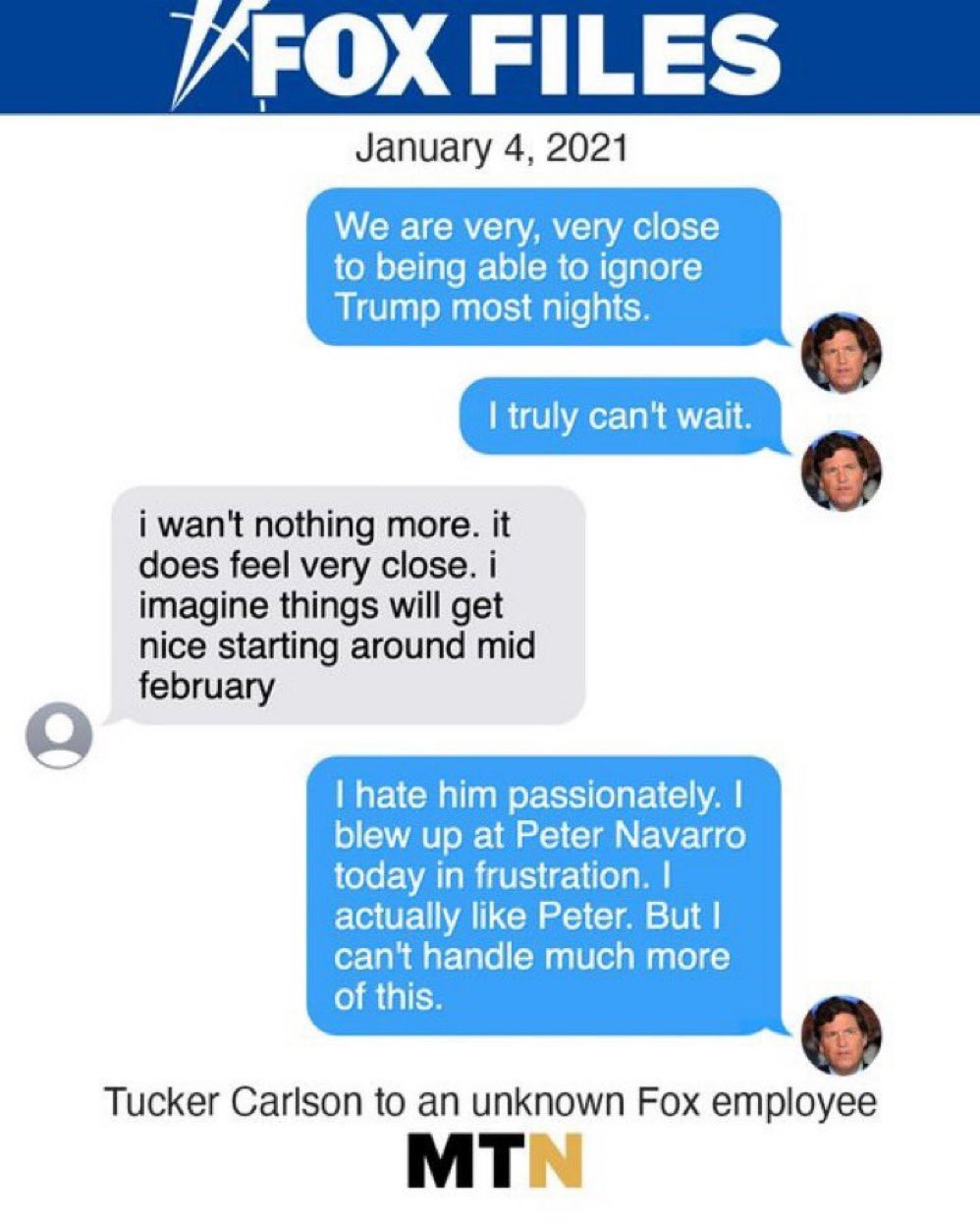
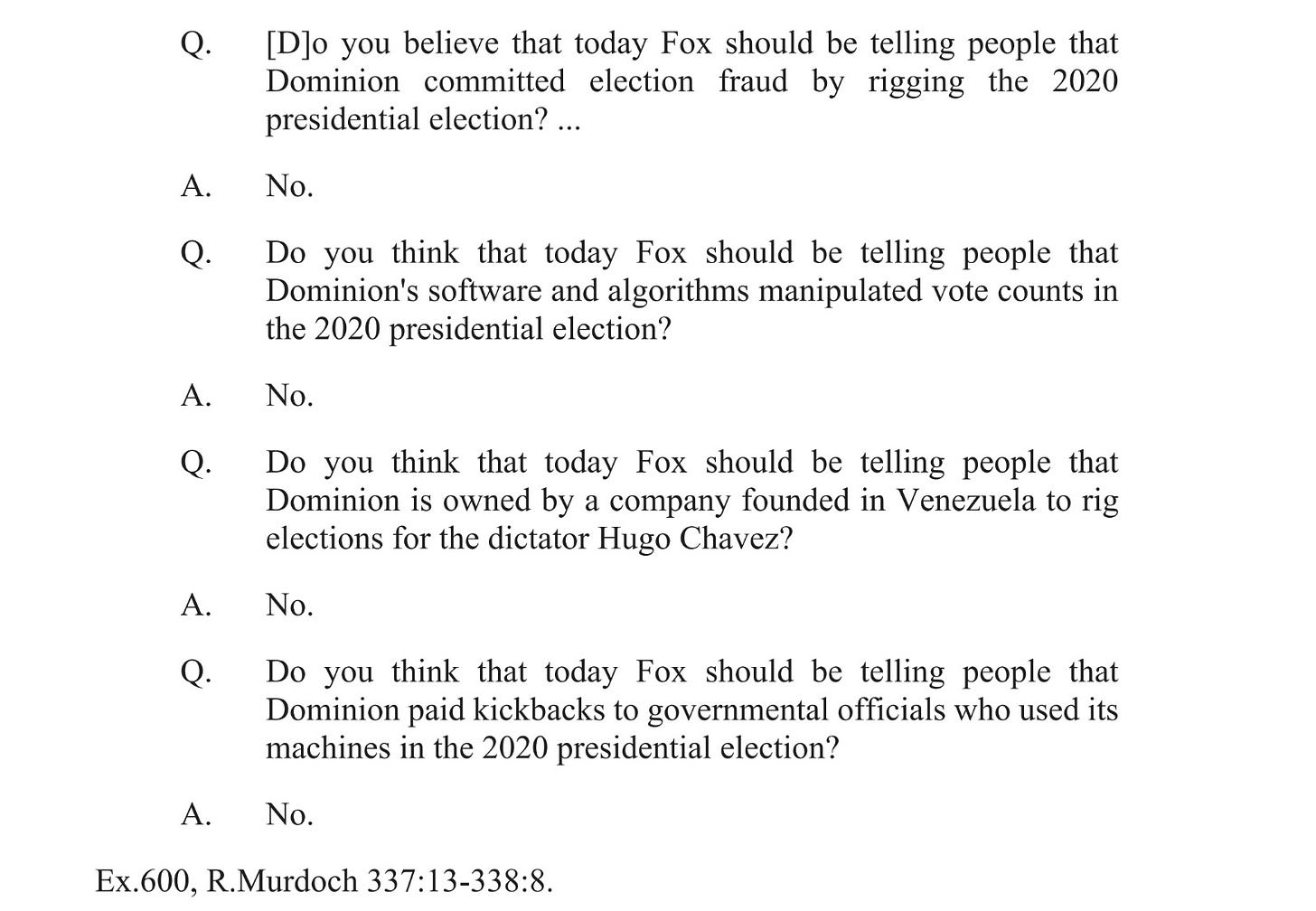
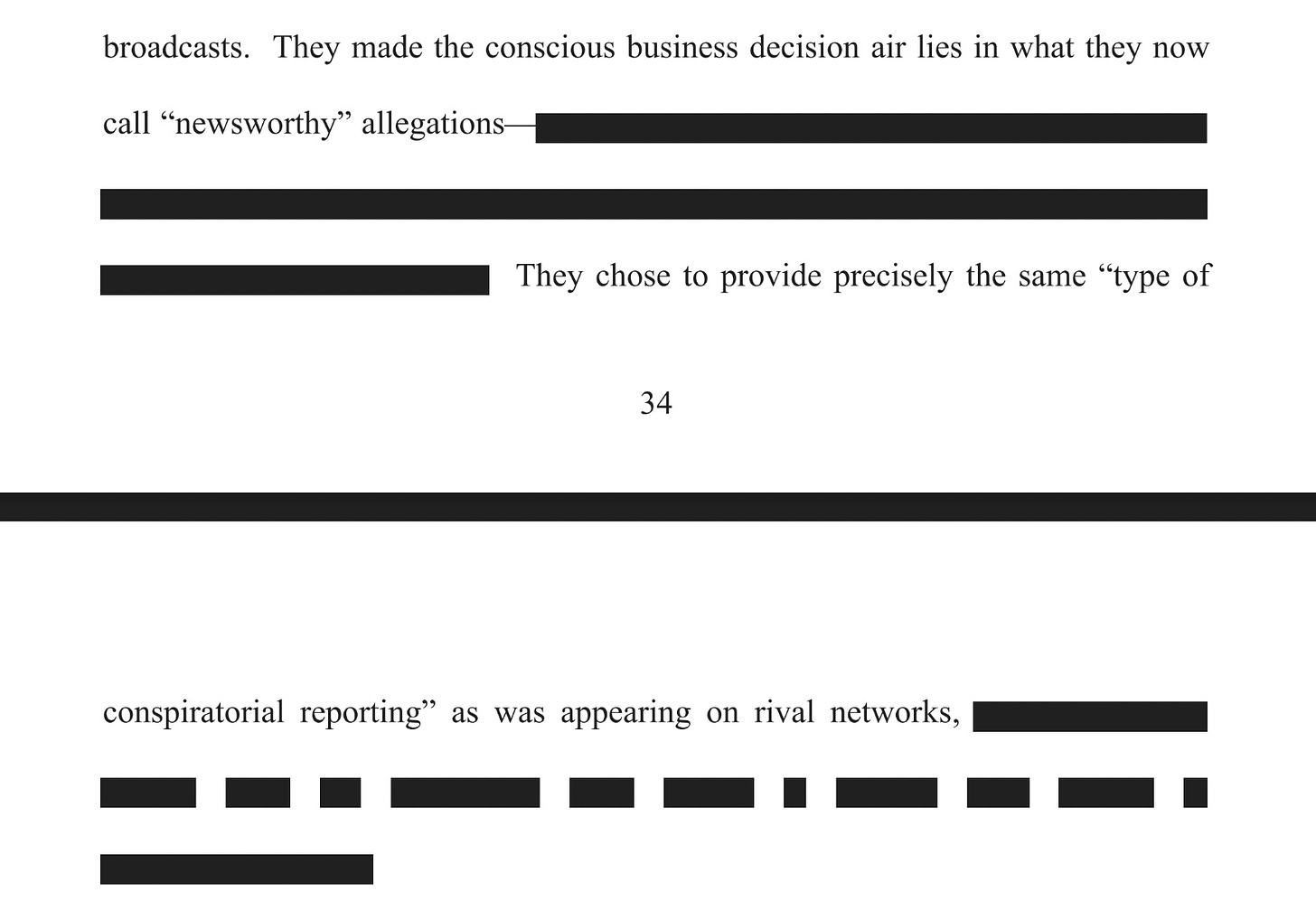
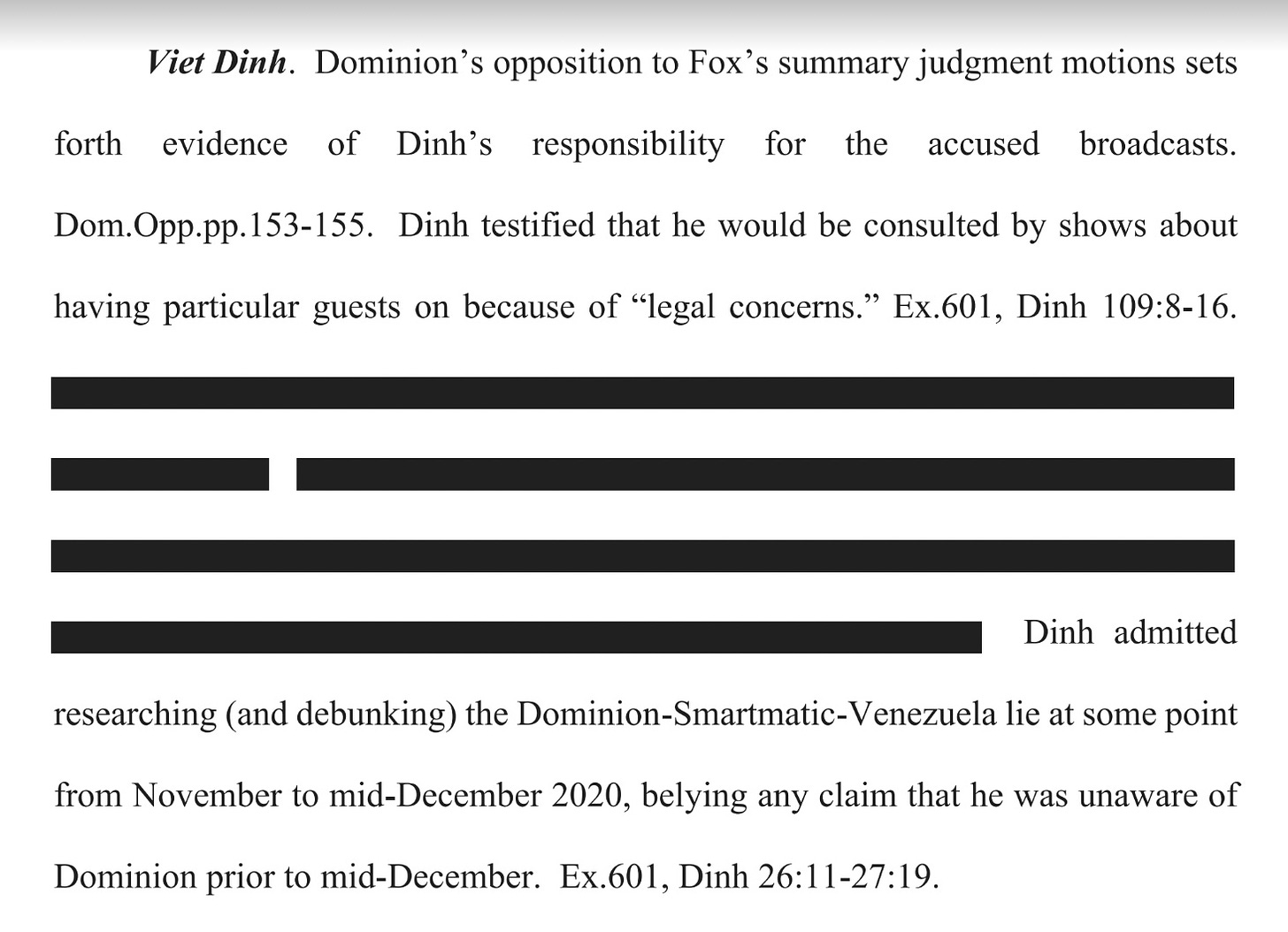
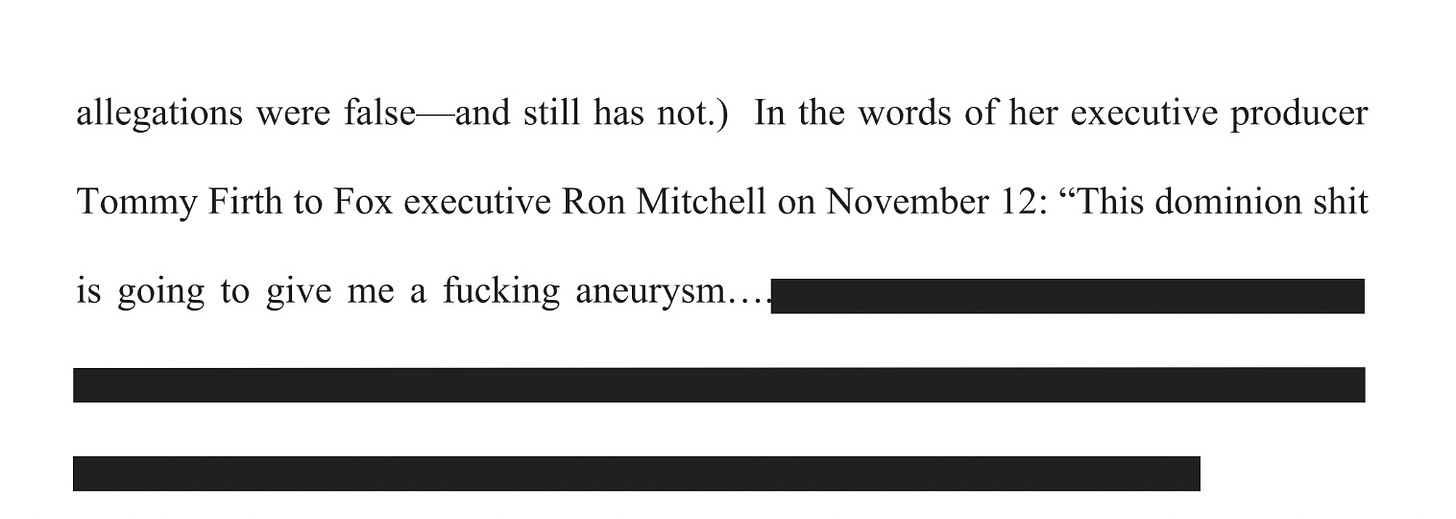
"The question is, how might Fox viewers react when they learn hosts who didn’t believe the Big Lie sold it to them, and that they did so to keep their own careers from faltering?" I doubt they will care, because until now they have managed to ignore every bit of truth and factual correction that casts doubt on Fox, Trump, and nonsense conspiracy theories. This crowd has also re-elected Margie 3-Names and Boebert, just two of the ignoramuses to whom McCarthy sold his soul. He so desperately wanted to go down in history as Speaker of the House, but, in truth, he will be remembered as a whore who was none too bright.
I am so thrilled to be following your thoughtful and detailed accounts of the issues in this case. I hope it goes to trial, even if summary judgment is available—and of course, the trial must be televised live! I would watch every minute! The country deserves to see the fox “personalities “ and executives admit to knowingly lying to its audience.
I hope that the eventual damage award can at least begin to repair the actual injuries to the public confidence caused by Fox’s reprehensible conduct.